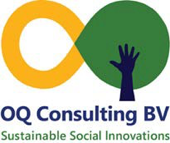Networking is about opportunity
In the NETSHEILA blog we pay a lot of attention to networking. NETSHEILA has a commitment to networking: we believe that networking – being related to other people – is how we as human beings involve others in our lives and projects.
This posting is about opportunity and about how companies respond to the opportunities that arise through the networking activities of their staff and ‘ambassadors’. How a company responds relies heavily on the culture of the company. That is why NETSHEILA says that by building a culture of cooperation in your organization using the principles of Tribal Leadership, the opportunities you create through networking can lead to business gain.
To network, you have to be open to opportunity. On the one hand, networking can lead to opportunity for you, and when the click happens, networking provides the other person with an opportunity to gain.
Tribal Leadership
Tribal Leadership distinguishes 5 stages of culture in an organization.
The lowest stage of culture is “Life Sucks” and is the kind of culture that street gangs have. Some organizations have them too: people who are ready to shoot each other down, because everything is meaningless anyway.
A step up from this is Stage 2: “My Life Sucks”. At least you have acknowledged that getting out of the gutter is better than being in the gutter, but what you notice is that everyone else is doing better than you, and that is just not fair! How old were you when you started saying “That’s not fair?” You certainly were not an adult, and indeed, people who live their lives in an adult way can get beyond this stage, easily.
That is when you move into “I’m great, and if everyone else was great, things would go better here”. Does that ring a bell? A lot of organizations have this culture. “I did everything I could to salvage the financial mess we were in, but we just didn’t have the quality of staff to move forward.” Because you are great, you try to keep tabs on what everyone is doing, and power is centralized. The majority of organizations function at this level, known as stage 3.
Dave Logan, the author of Tribal Leadership, says “Culture eats strategy for breakfast”. If the culture in your organization is stage 2 or stage 3, then whatever strategy you may try to implement will be approached with objections like: ”Its not fair, I’m being left out” or “If it was up to me this would work, but the other people here are going to make the strategy fail, I’m sure!”
That’s when you realize you have to jumpstart into a completely new way of approaching the culture of the organization. This is Stage 4: “We are great (and other organizations can’t compete with us)”. What is very special at this level is that managers do not control what their staff do. Instead, the staff operate from their values and through triads – groups of three people – colleagues hold each other accountable to being true to their values. To make this more tangible: people choose their work for many reasons. A cynic may say it is for the money, and if this is the case the culture of the organization in which that person works and that allows that level of cynicism, can never rise beyond stage 3. If people are willing to acknowledge they have chosen this work because it matches their values, the opening arises for a stage 4 culture. In a stage 4 culture in schools, for example, people acknowledge they are there with some kind of commitment to children, the next generation, the future of the planet, the quality of life. At school, things happen. Stage 3 cultures get upset about the things that happen. In stage 4 cultures, triads support each other to look at the things that happen in the light of each person’s commitment, and people act from their commitment rather than from the immediate response. Triads are powerful!
There is a 5th stage. In the 5th stage, the conversation is “We are great and together we can all make change happen”. Stage 5 organizations are beyond competition. An example of a stage 5 conversation would sound like this: “We can cure cancer if all the pharmaceutical companies plus university labs plus scientific research companies and environmental health specialists and environmental activists put our heads together.“ This 5th stage is totally possible and I for one would love to work in companies who operate at this level.
Linking this back to networking as opportunity, when you operate from a higher stage in Tribal Leadership, the kinds of conversations you have when you meet people will reflect that.
How does that work in your company? If you go to a networking opportunity, lets say a business conference with a gala dinner, and you meet some inspiring people who do inspiring things, do you think to yourself: “I can’t wait till I tell this to my colleagues. They are going to be keen to explore cooperation”? Or do you think ”If I tell people about this opportunity someone is sure to shoot it down, and we probably do not have enough resources anyway to follow up.”
If you would like a different answer to the one you think you will get, its time to transform the culture in your organization.
NETSHEILA works with organizations to build cultures of cooperation. Call us, and lets talk about how we can upgrade the culture in your company or organization.
Our clients



















